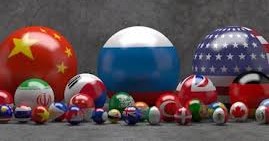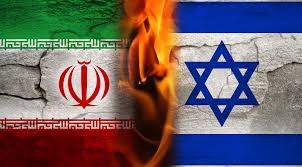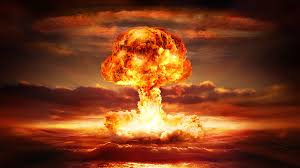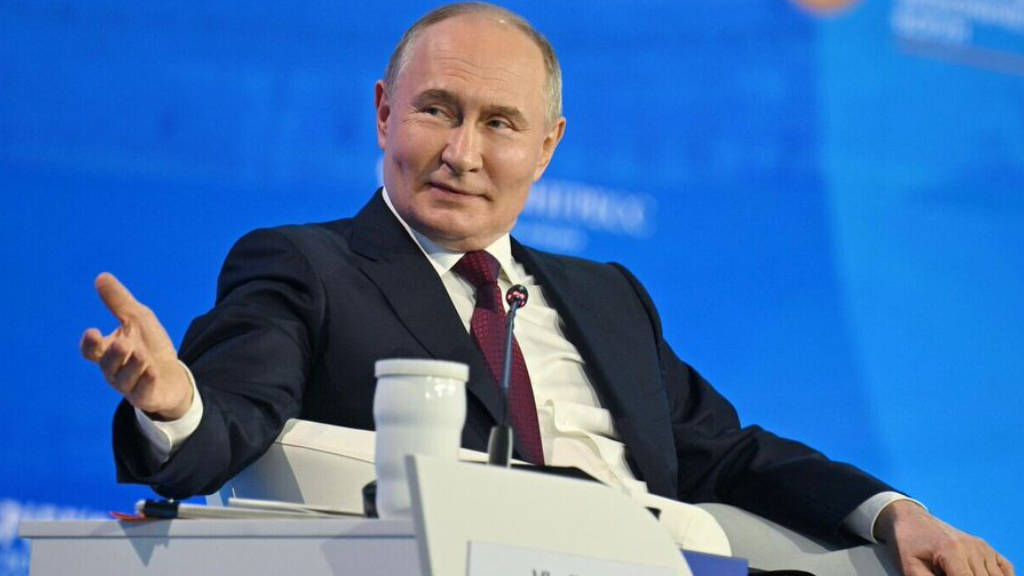President Putin has engaged in a lengthy, moderated Q&A session, with Nadim Koteich, of Sky News Arabia the moderator at the SPIEF 2025 event. Questions were direct and included involved answers from Putin about the concept of developing a multipolar global society, in-depth discussions about the Israel-Iran conflict, the Ukraine conflict, and issues pertaining to foreign investment and clarity on the much discussed ‘buy-back’ clauses.
This is what they had to say.
Multipolarity

NK: “The overarching theme of this years’ SPIEF forum is “Shared Values in a Multipolar World”. This is a very high ambitions’ ceiling. What does Russia bring to the table on that regard?”
VP: “I attempted to convey this in my speech. It seems to me that everything that Russia is doing is aimed at uniting the efforts of all our partners, friends, and everybody who wants to work with Russia to address these global civilisational challenges.
Above all, we seek to make global development balanced and consistent with the interests of as many countries as possible, to shape a multipolar world order where members of the international community would agree with each other and create tools enabling them to find solutions even in most complex conditions – solutions that would benefit everybody rather than certain groups or associations, military or economic blocs.”
NK: “Mr President, this effort to build a multipolar world seems like more of a resistance of an existing order, rather than a genuine, consistent, coherent effort to create a multipolar world that you’re talking about. Is it an objective-driven effort or it’s only resisting current unfavourable kind of order?”
VP: “To my mind – and I have already spoken about it on various platforms in the past – changes are occurring regardless of whether we facilitate these changes or not. These are objective global development trends.
I also stated that changes in the world are of a fundamental nature, occurring due to the emergence of new economic leaders. Look how the so-called G7’s share in the global economy has shrunk in recent years. It continues to shrink year after year. And look how the share of BRICS countries is growing.
This is an objective process, independent of any clashes or acute armed conflicts worldwide. This process has continued for decades. And when they claim that Russia has only recently pivoted toward relations with the Global South and Asia – well, this is incorrect. We made this decision long ago, in alignment with persisting global and objective trends.
Africa will soon have a population of 2.5 billion. You know, this is a hard fact. It will happen and nothing can stop it. What will all these countries, peoples and continents strive to do? To improve the well-being of their peoples. They will definitely strive to increase their economic and humanitarian potential. These are inevitable things that are happening to our civilisation.
Our task is to give this inevitable process a civilised framework and to undertake joint efforts that will not only accelerate these trends but also render them more balanced. This is to ensure that decisions are timely, most effective, and mutually beneficial for all participants in this transformation, including, incidentally, those nations that are gradually yet inevitably ceding some of their former positions in the global economy.
We remain willing to negotiate with them as well, prepared to seek common ground on all matters, if they genuinely want this. But should they insist on preserving their monopoly at any cost, should they cling to the instruments of colonial influence in global affairs, then they must reconcile themselves with the diminishing position they inevitably assume through such conduct.
This encapsulates the purpose behind all our efforts – both in the national dimension, with due account for our domestic and foreign policy, and in collaboration with our friends and partners.”
US & Israel vs Iran

NK: “Let me bring the conversation from values closer to the conflict areas in the world.
Israeli statements are normalising the fact that a country might kill the president of another country. That is basically the conclusion of last week’s statements. Yes, Ayatollah Khamenei is not a head of state, but he has enough gravitas to be considered the head of state and to be protected by the articles of international law. But when we normalise the idea – no matter where you stand on Iran – when we normalise the idea of a country killing the president of another country publicly, what kind of new rules are being set? They are obviously contradictory to the kind of values you’re trying to put forward, isn’t that so?”
VP: “I note the statement: “Russia and China are creating a new world order.” Russia and China are not creating a new world order; rather, we are only giving it form. The new world order is emerging naturally, like sunrise. There is no escaping it. Our role is to help shape its contours, perhaps clearing the way for this process to become more balanced and aligned with the interests of the overwhelming majority of countries.
We strongly anticipate that all nations will come to recognise and eventually understand – as I have previously stated – that this approach to finding a solution proves far superior to coercive pressure or the neo-colonial paradigm in which humanity has lived for centuries, if not millennia.”
NK: “Would you allow me to go back to the question about normalising the talk about a country killing the president of another country, in the case of Iran and Khamenei and Israel within this conflict. I mean, it seems that those who are making the new values are not the Global South, obviously, not Russia, not China, it’s the Israelis. Are you comfortable with that? The new values now are that one country is setting the rules for another country that who has or doesn’t have enrichment, for example. One country is threatening to kill the president or the head of that country. Are these values defendable in any way?”
VP: “To me, there is nothing new about it. This is the first point. Second, and I wish to emphasise it, the Russian Federation has consistently advocated for guaranteeing every nation’s security without compromising that of any other state. This remains our principled approach. This may sound like a generalised answer but let me assure you: it is the actionable policy of the Russian Federation.”
NK: “Allow me for a very direct question about the situation. Donald Trump is seeking what he calls the total surrender of Iran in terms of the nuclear project. Would you seek the total surrender of Vladimir Zelensky in the same way?”
VP: “First, these situations are fundamentally different. Second, our objective is not Ukraine’s surrender. We insist that Ukraine recognise the established territorial realities.”
NK: “Mr President, on a more practical question concerning the crisis in the Middle East, the current crisis touches on geopolitics, energy, and it has repercussions that go beyond the parties involved in the struggle.
Is it a test for how the South can play a role in mending the fences between both countries, in putting some good imagination around the solution, architecting a solution that can be acceptable by two parties that are fighting, you know, head-to-head? Is this a test for what you are proposing and trying to create as political weight for the South?”
VP: “Yes, I believe it is quite possible. Experience and reality demonstrate that many states of the region maintain in some ways complex and in some ways stable relations with both Israel and Iran. This provides reasonable grounds to believe – and indeed to hope – that the Global South collectively, and regional actors specifically, can exert influence to help put an end to this acute phase of confrontation.
When I said that Russia’s principled position is that no country’s security should be guaranteed at the expense of other countries’ security, here we have, on the one hand, Iran’s uranium enrichment programme, Iran’s legitimate right to carry out such activity, its right to peaceful nuclear energy development; and, on the other hand, there is Israel’s security concerns. I am convinced that a mutually acceptable solution can be found. Countries of the Global South, especially countries of the region, can undoubtedly have a positive influence on this process, on this search for solution. I believe such a solution exists.”
NK: “Today, the Russian Ambassador at the United Nations said that the only way forward is a political solution between Iran and the Israelis. Are there any preliminary points about the solution or are we still too far from that?”
VP: “In such situations, it’s always better not to run ahead so as not to upset the process. That said, in my opinion, there are certain points of common interest. We have set forth our position to both parties. As you know, we maintain contact with Israel as well as with our friends in Iran. We do have certain proposals involving Russia.
I must emphasise that we are by no means positioning ourselves as intermediaries. We are merely putting forward ideas. Should these ideas prove to be appealing to both countries, we will be simply pleased. I will repeat, we maintain contact with Israel. As you are aware, not so long ago, I spoke with Prime Minister Netanyahu, as well as with the President of Iran and the President of the United States, who are certainly directly involved in these developments. I presented them with my vision and a potential path to resolving the situation. Our proposals remain under discussion. We maintain near-daily contact with our Iranian friends, so we will see how the situation unfolds. I would like to see our ideas among those implemented.”
Ukraine

NK: “How is the war in Ukraine reflective of the values that the St Petersburg Forum is trying to put forward, to defend, to underscore?”
VP: “It is very easy to explain. And it is directly related to what we said before, what I said before. I said that no country’s security should be guaranteed at the expense of another country’s security.
From the early 1990s and for decades, we received repeated assurances that by no means, never, under no circumstances, NATO would expand eastward. After that, we have witnessed five, or effectively six, expansion waves. Despite our persistent objections, these were ignored. This is the first.
Without doubt, these represent rudimentary manifestations of the old, or even centuries-old, neo-colonial policy upgraded to a certain extent in order to align with contemporary trends, while retaining its fundamental nature. These are exercises of power politics that disregard the legitimate interests of the Russian Federation. This is my general assessment.
Regarding Ukraine, all developments there similarly constitute exercises of power politics. What am I referring to? The bloodstained anti-constitutional coup in Ukraine. What did this represent? More power politics. The previous US administration openly admitted it had invested billions of dollars in orchestrating the coup. These admissions were made publicly, without any constraint.
Our objective was to protect the population that historically and culturally identified with Russia, the Russian culture and its people – specifically, the residents of Crimea. Subsequently, we attempted to settle the situation in southeastern Ukraine, particularly in Donetsk and Lugansk. We made attempts.
However, once again resorting to power politics, our ideological adversaries, so to speak, chose to impose a military solution in Donetsk and Lugansk – in Donbass. It was not Russia that initiated hostilities. Following the anti-constitutional coup, part of the population in southeastern Ukraine rejected both the coup’s outcome and the authority of its perpetrators. It was against them that military operations were first launched.
We made attempts to achieve a peaceful resolution and to put together broken pieces, but our so-called “partners”, as it was further revealed, initiated the peace talks for one purpose only: to arm Ukraine and continue these hostilities.
Ultimately, we had no choice but to recognise the independence of these republics – Lugansk and Donetsk. For eight years we refrained from such a decision, persistently pursuing diplomatic solutions. But eventually, we were forced to recognise their independence and extend our support, including military assistance, in order to end the war launched by our Western adversaries and by those whom they relied and continue to rely on now in Ukraine – the radical nationalists and neo-Nazis.
Therefore, responsibility for the tragedy in Ukraine lies not with Russia. It is the responsibility of those who refuse to reconcile with the global changes in the world.”
NK: “Your army is advancing beyond the four areas that are considered Russian by Moscow. So, what is your endgame? How is your army going to go and for what effect?”
VP: “You mentioned the regions in Ukraine that we regard as part of Russia. I have stated on numerous occasions that, in my view, the Russian and Ukrainian peoples are essentially one people. In that sense, we see Ukraine as ours.
However, we also recognise the realities on the ground as they evolve. There are many individuals in the neighbouring country who are committed to asserting their sovereignty and independence, and we respect that. In fact, we have never denied the Ukrainian people’s right to independence and sovereignty.
At the same time, the foundation for Ukraine’s independence and sovereignty was clearly established in its 1991 Declaration of Independence, which explicitly states that Ukraine is to remain a non-aligned, non-nuclear, and neutral state. It would be constructive to revisit these core principles, as they formed the basis upon which Ukraine gained its statehood. That is the first and most fundamental point.
Secondly, from the very outset – when the conflict had already escalated significantly – we proposed to the Ukrainian leadership at the time that hostilities be halted immediately. We called for the withdrawal of Ukrainian forces from the regions where the local population had clearly expressed their desire not to remain within Ukraine, particularly in response to what they perceived as unconstitutional and anti-state actions. These people sought either independence or integration with Russia. Our proposals were rejected.
Furthermore, these are not purely political decisions, but rather the result of military logic. Military commanders assess terrain – rivers, hills, ravines – and determine the most strategic paths to advance while minimising casualties and achieving their objectives. As a result, the dynamics of military operations naturally lead to the presence of troops in various territories. There is an old saying, not quite a proverb, but a long-standing principle: wherever the foot of a Russian soldier steps is Russian land.
I do not want this to sound militaristic. But the truth is – and I want to emphasise this very clearly, as it is absolutely sincere – at every stage of the unfolding events, we proposed dialogue. We consistently urged our counterparts in Ukraine to stop and engage in negotiations.
We said: “Let us talk now, before the situation deteriorates further. Continued reliance on military action alone risks leading to more difficult circumstances, after which any negotiations would have to take place from a much less favourable position for you.” This scenario repeated itself more than once.
There are well-known political figures from other countries – thankfully still alive and well – who can personally attest to our repeated proposals to halt hostilities. On several occasions, after hearing our suggestions, they would leave Moscow for Kiev, but later on they would tell us: “We’re being accused of acting as Kremlin agents. That’s it, we are stepping back and will no longer be involved.”
Each time, the response we received was a firm “no.” And we warned: if this path continues, the consequences will be more severe. Still, they refused to engage. Why? Because certain actors, particularly in Europe, still operate with outdated, neocolonial mindsets. They believed that they could easily exploit the situation to their advantage by weakening, destabilising, or even dismantling Russia, all in the hope of reaping strategic or economic gains.
I am sure that this is why former Prime Minister Boris Johnson – undoubtedly at the urging of the former US administration and Mr Biden – travelled to Ukraine and advised against reaching any agreement with Russia. Yet the agreement was already on the table. During the negotiations in Istanbul, as I have said before, we had reached an almost complete consensus on nearly every issue. All that remained was to finalise the accord. I was prepared then to meet with the head of the regime and finalise it.
But no, they had to send Mr Johnson, clearly with the support of the then Biden administration, to dissuade Ukraine from signing the agreements. Instead, they attempted to secure what they called a “strategic defeat” of Russia on the battlefield. The result? New territories came under our control. The Russian Armed Forces are now advancing daily along the entire line of contact.
Look at what they have done – they entered our Kursk Region. First, they lost 76,000 people there. That’s a catastrophe for them – 76,000! In the end, as we said, we pushed them out. But they started posing a threat all along our state border with Ukraine, in two other neighbouring regions as well.
What has this led to? They already lack manpower, and now we’ve had to establish a security zone along large sections of the border, forcing them to divert troops – troops they can’t spare – from critical parts of the frontline.
Their combat units are only 47% operational. They are losing combat capability. And they have stretched the line of contact by nearly 2,000 kilometres. We already had a 2,000-kilometre front, and now they have created new threats along the border, adding another 1,600 kilometres or so.
They have spread their armed forces thin. From a military standpoint, it’s hard to imagine a more strategically flawed decision. They are creating problems for themselves, and we are forced to respond.
You mentioned “some other territories.” Yes, that’s true. But specifically along the state border, they entered the Kursk Region, committing multiple crimes against civilians.
We pushed them out, inflicting huge losses in the process. And now we must establish security zones along the border because they keep launching artillery and drone attacks.”
NK: “How deep is the security zone?”
VP: “In the Sumy Region, the depth of our operations ranges from 10 to 12 kilometres. Around 8, in some others 10 or 12 kilometres. Then comes the city of Sumy, the regional centre. We don’t have an objective to take Sumy, but I would not rule it out either.
Why are we doing this? Because they are creating threats for us, constantly shelling border areas. This is the result of their utterly reckless, unjustifiable actions.
The only goal was political: to demonstrate that they still can receive something from their foreign sponsors. They have already received nearly US$250 billion. But no, it’s never enough. They want more and more – and on top of that, half of it is being embezzled, if not more.
That’s why we are now operating in these territories. This is the logic of how the confrontation has unfolded and what has driven it.”
NK: “In a previous answer about Ukraine, you mentioned the nuclear aspect of Ukraine in a very subtle way. To be honest, I have read some reports, most of them are in Russian media, that there is an assumption that Ukraine might opt for using a dirty bomb against Russia. Do you take these reports seriously? Do you have intelligence that supports this kind of probability?”
VP: “First of all, it would be a colossal mistake on the part of those who we refer to as neo-Nazis on the territory of present-day Ukraine. It might even be their last mistake. Our nuclear doctrine, common sense, and the way we operate in real life indicate that we always respond to threats posed to us in a symmetrical manner. We always respond and always symmetrically.
Therefore, our response would be extremely tough, catastrophic for the neo-Nazi regime, and unfortunately, for Ukraine itself. I hope it never comes to that.”
NK: “From the tone of your answer, I can conclude that you take these reports seriously. Is there evidence supporting these reports? Like intelligence evidence?”
VP: “No, thankfully, we have no confirmation of any such intentions. However, we operate on the premise that someone with a sick imagination might come up with such ideas. I believe I have provided a comprehensive answer with regard to our potential response.”
Iran & Israel

NK: “In Western media, there are reports saying that the Iran war is a good thing for Russia. First, the oil price is up. Second, the West has one more problem on its table to take care of. And third, Ukraine is on the back burner, so all the news is on Iran rather than on Ukraine. How would you comment on that? And what do you say for those who are saying that Russia is unreliable, a lie, because it did not step up for Iran?”
VP: “Those who promote narratives about Russia being an unreliable ally are provocateurs. They are provoking the situation. But it will not help them; they will not achieve their goals.
First of all, conflicts only look similar. Now, regarding whether Russia is a reliable ally, or not. It has already been mentioned here that we must show certain solidarity, and that is true. But in every case, conflicts are, nevertheless, fairly unique.
I want to draw your attention to the fact that nearly two million people in Israel are immigrants from the former Soviet Union and the Russian Federation. Today, Israel is almost a Russian-speaking country. In modern Russian history, we have always taken that fact into account. That is the first point.
Second, we have traditionally had very good, trust-based, friendly, and allied relations with the Arab and Islamic world. Given that around 15% of Russia’s population is Muslim, we hold an observer status at the Organization of Islamic Cooperation. That is also a factor to reckon with. We must be mindful of these aspects.
We have friendly relations with Iran. First, we always fulfil our obligations – this also applies to the Russia-Iran track. We support Iran in its efforts to defend its legitimate interests, including its interest in peaceful nuclear energy. We have always maintained this position. Our principled stance on this matter and in this conflict has not changed.
Some say we should have done more. More in what sense? Launch military operations? We are already conducting military operations against those we see as opponents of the ideas that we defend, and those who pose a threat to the Russian Federation. Fundamentally, those forces are the same in Iran and in Russia. They are located somewhere in the rear areas, behind our backs. However, they are not the ones who are on the line of contact.
We have certain obligations, and we defend Iran’s right to peaceful nuclear energy not in words, but in actions. What does that mean? Despite the challenging situation surrounding Iran, we have built a nuclear reactor in Bushehr. We have signed a contract to build two more nuclear reactors. Despite the difficult situation, despite certain risks, we are continuing this work. We are not evacuating our personnel from there.
Moreover, relying on a certain level of relations with Israel and our improving relations with the United States, we raised this issue with Israel and President Trump. We will keep doing our work in Iran based on our view of Iran’s right to peaceful nuclear energy, and of us acting strictly within international law, and we request that our personnel remain out of harm’s way.
Prime Minister Netanyahu agreed with that, and President Trump promised to support our legitimate request. Does that not count as support of Iran? I believe it is direct support. In addition, we have adopted a particular stance at the UN. I am convinced that our position at the UN and elsewhere serves the interests of both Iran and the State of Israel.”
World War Three

NK: “SPIEF this year coincides with the 80th anniversary of commemoration of the Day of Victory in World War II. Are you concerned that we are heading into World War III in any way?”
VP: “Yes, I am. I mean it. The conflict potential abounds and it is growing. Right under our noses – and this directly concerns us – there is a conflict that we are enduring in Ukraine. There are the developments in the Middle East as well. We are very concerned about the events related to Iran’s nuclear facilities and potential ramifications.
Without a doubt, this requires us to not only focus on the unfolding events, but also to look for solutions, preferably peaceful, across all areas. I mean it sincerely.”
Foreign Investment

NK: “Mr President, I listened very carefully to your speech, and you mentioned investments, but it wasn’t that clear about foreign direct investments. Where does Russia stand on that? Where do you stand on that? Do you still care about foreign direct investments? Do you see it as an opportunity or as a burden?”
VP: “We believe that private investment is what we need, and the Russian economy is unlikely to develop effectively without this. Well, this also concerns foreign investment in full measure. We did not evacuate our investors (who worked here for a long time) from Russia, and we did not expel anyone from our country. Many investors quit of their own accord, suffering major losses. But our policy in this sphere has not changed. Yes, in principle, our economic operators boast a sufficiently impressive investment potential, but we certainly welcome any foreign investment.
In the first quarter of 2025, fixed capital investment volumes soared by 8.7%. I know that certain problems facing Russia were discussed; this includes tensions linked with the high key interest rate, and investment will not be retained until the end of the year. Nevertheless, the Central Bank assumes that, in late 2025, the real economy will continue to borrow loans at 10–11% interest. We shall see how this works out. I would really like this to come true.
But we certainly welcome foreign investment, and we will do our best to create favourable conditions, so that our partners would feel comfortable here.
Prince Nasser bin Hamad Al Khalifa from Bahrain is here. They have already reached an agreement with the Russian Direct Investment Fund on launching specific work. The first steps have been taken. These projects may not be very impressive, totalling about ₽15 billion (US$191.5 million), but we are working very actively with the United Arab Emirates in the field of sovereign funds. We are cooperating with Saudi Arabia and other countries. By the way, our partners and our friends did not make this decision yesterday or today; they made it several years ago. They trust their Russian partners and simply automatically (I would like to emphasise, automatically) co-invest in projects financed by Russia’s Direct Investment Fund – with 10% returns.
They are doing this promptly, without inquiring about future results. This is a sign of their high trust, and we appreciate this very much. Later, they invest more and more. You should speak with Kirill Dmitriev (head of the Russian Direct Investment Fund) who will provide the final statistics. This involves tens of billions of dollars.
It is possible to use this also through other sources and tools. We have virtually no restrictions for our foreign partners, in terms of applying their efforts and channelling their capital. I believe that this is a key trend in our cooperation.”
Foreign Buyback Policy & Nationalisation

NK: “There are two trends that I realised talking to Russian businessmen, either here or back in my country, the UAE. Is there is a kind of Russian rejection of buyback? When the war happened, there were some foreign investments that were bought by Russians, and now these might want to buy back their investments.
Russia seems to be blocking that, because new Russian entrepreneurs bought and invested in these operations. The second trend that I realised is that people are a little bit worried about nationalisation. There are some nationalisation efforts taking place within Russia. I heard about one of the airports being bought back or even taken by force of court from the Russian owners. So, how do you see these two trends impacting the rebound of the Russian economy?”
VP: “Nationalisation cannot have a positive effect on Russia’s economic growth, and we realise that. As far as I understand, the case you mentioned is the case of Domodedovo Airport in Moscow.
I apologise for my language but the fuss surrounding this facility has persisted for quite some time. The dispute between the entities involved did not emerge recently. It has continued for many years before ultimately being resolved through judicial proceedings. This case has nothing to do with nationalisation. Nationalisation is a process stipulated by law. We do not enforce this law or its provisions.
As I previously said during a meeting with the business community, in my opinion, the problem is that during privatisation, significant injustice occurred. Assets worth millions were privatised for a nominal price of one ruble. This is clear. From a standpoint of social justice, those decisions were far from perfect. However, it would be an even bigger mistake to reverse everything now.
Therefore, my opinion is, we must establish clear statutory limitations for such transactions and resolve this matter once and for all, conclusively.
The situation you described has nothing to do with de-privatisation. Regarding the potential return of our partners, so-called “buyback,” several aspects also need careful consideration.
First, we need to identify which companies left our market, under what circumstances, and on what grounds. If some companies departed for political reasons, under the pressure from the political elites in their home countries, this makes them unreliable partners. Their withdrawal put their workers at risk of losing their jobs. This appears to have been the intended outcome. However, the negative impact was mitigated as Russian businesses took over management and filled the opening niches. Frankly, from this perspective, those decisions ultimately changed the quality of the Russian economy by enabling our business leaders to join the management of these companies or become owners.
However, where legally binding agreements exist that guarantee buybacks, Russian companies will honour these obligations. We support fostering reliable and stable business relationships, yet this has not always been reciprocated by all parties.
In light of these considerations, the Russian Government has received instructions to take action. I am asking members of the parliament to endorse the proposed regulatory improvements. It is necessary to ultimately decide on the return of international companies seeking to re-enter our market. We must support everything that benefits us.”
Further Reading
President Putin’s Speech At SPIEF 2025: Key Points & Analysis

 Русский
Русский













